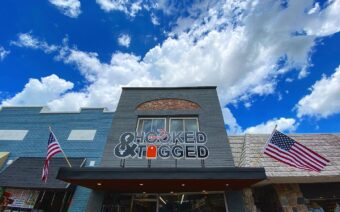
December 9, 2024
STEVENS POINT – For 53 years, the Stevens Point Area Co-op (633 Second St.) has been on a mission to promote local foods, local economy and healthy options.
Established in 1972, the co-op has been a staple in the community providing another outlet for local farmers and producers to get their products to the community.
With memberships priced in tiers from $25-40 a year, Co-managers Julia Stamp and Andrew Breitenstein said this co-op is a place where one doesn’t need wealth to pursue health.
What is the co-op?
The co-op is an independent, consumer-cooperative full-service grocery store that is member-owned and collectively managed.
Breitenstein and Stamp said they provide and sell high-quality, organic, locally produced whole foods and small-scale products while focusing on environmental sustainability.
Beyond the products, the co-managers said, the co-op exudes a warm atmosphere inside the building where customers can catch up with one another, akin to a “Cheers”-like atmosphere, only healthier.
For a co-op to operate for 53 years and counting, Stamp said its success is driven by customers’ desire for high-quality products and local food.
“You can count on coming here and knowing your values are being matched,” she said. “We’re really mindful about the ingredients that go into our products.”
Stamp said one of her jobs is buying products for the store, which gives her an opportunity to support small, local vendors, while also being able to make a difference in the food system at large.
A peek inside
The big draw for the store, the co-managers said, is rooted in health food options focused on sustainable, organic production.
Breitenstein and Stamp said they bring in products that are fair trade, use sustainable packaging and have environmental ethics.

Stamp said she and Breitensen also avoid products containing artificial colors and flavors, abiding by a unique meticulousness regarding ingredients.
One example, Stamp said, has been palm oil.
For the co-op, any product containing palm oil must be sustainably certified, she said, likening the necessary research to “homework for a purpose.”
Though sometimes the co-op’s costs – which account for the extra care and effort – are slightly higher than those of big box stores, she said it shines in the treatment of customers and employees alike.
Not only is the employee pay fair, Stamp said, but the co-op offers discounts to members, students, seniors and working members – volunteers who exchange their time for lower prices.
The co-op also donates to and supports local food pantries and charities with its giving programs, the co-managers said.
One such program, they said, is the “scratch and dent” produce bin where produce is sold for $0.99, with all proceeds from that bin being donated to food pantries.
Stamp and Breitenstein said purchasing annual memberships to the co-op supports these causes, while members enjoy the benefit of saving 15% on every item’s cost.
Other membership benefits, they said, include the ability to:
- Participate in board and management circle meetings
- Run or vote in the board elections each spring
- Apply to join a management circle
- Vote for programs the co-op participates in
- Influence which products the store stocks
- Become a working member
- Contribute to other general decisions about the co-op
Unique offerings
Breitenstein said the convenience the store offers is a top benefit enjoyed by many members.
“You can walk in, and walk out with your products,” he said. “It’s small. too, so you can be quick.”
Stamp said she favorably compared the atmosphere to that of a neighborhood bodega, with its neighborhood location and simplicity of available products.
“Because it’s small, you don’t have to think that much about the products you’re getting,” she said. “You avoid the ‘decision anxiety’ of a larger grocery store, especially if you’re looking at labels. We’ve put thought into the ingredients… For some, that’s just (the case for) a small section of a store. For us, it’s the whole store.”
Keeping it local
When sourcing local items and products, Breitenstein and Stamp said they like to maintain a 20- to 30-mile radius, though they’re willing to search further out in the region so long as products abide by the store’s values.
They said the co-op is able to offer seasonal produce year-round, a large selection of regional dairy products and exclusively Wisconsin-based maple syrup and honey.

Beyond fresh produce and dairy, Breitenstein and Stamp said the co-op carries a large variety of locally produced soaps and hygiene products, teas, dried herbs, canned and pickled foods and sauces.
Environmental benefits
Stamp said another operational benefit of running a co-op is the potential to aid natural ecosystems.
“Putting food in the garbage is the absolute last resort,” she said. “If we can’t sell it, employees will take it home – and if they can’t do that, we’ll compost it. This isn’t something I see handled well in a lot of larger stores, and I think it’s cool that we can do that.”
Stamp said the co-op utilizes a local company called Bucket Ruckus, which does curbside pick-up for compostable items.
“It makes composting really easy,” she said.
Connecting the community
Breitenstein and Stamp said vendors who sell through the co-op take heart in knowing they’re supporting the local economy.
In turn, Stamp said the co-op’s communications and marketing team supports their vendors by emphasizing local products in promotional emails and social media posts.
Products gain further exposure, she said, due to all of the events the co-op hosts and participates in.
Stamp said the environmentally focused University of Wisconsin-Stevens Point has also helped to raise awareness about the store and is patronized by many of the college’s instructors.
Though the shop remains independent of any formal partnership with the college, she said the co-op has hosted class tours and discussed offering more student internships in marketing and communication.
As a community entity, Breitenstein said the store is a one-stop shop for healthy, sustainable options.
He said there is a symbiotic relationship between the community, the store, its members and its vendor which comes down to providing products people feel good about purchasing.
Learn more about the co-op by visiting spacoop.com.
 Getting modern tools into the hands of today’s learners
Getting modern tools into the hands of today’s learners The importance of the entire fish – scales and all
The importance of the entire fish – scales and all








